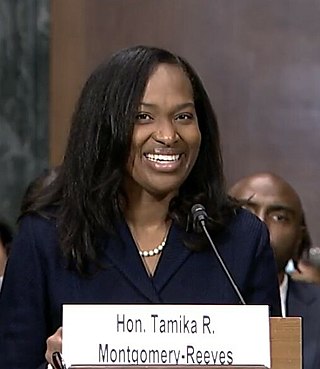Related Research Articles

Charles Layman Terry Jr. was an American lawyer and politician from Dover, in Kent County, Delaware. He was a member of the Democratic Party and served as Chief Justice of the Delaware Supreme Court as well as Governor of Delaware.

Josiah Oliver Wolcott was an American lawyer, politician and judge, from Dover, in Kent County, Delaware. He was a member of the Democratic Party, who served as Attorney General of Delaware, U.S. Senator from Delaware, and Chancellor of Delaware.

The Delaware Supreme Court is the sole appellate court in the United States state of Delaware. Because Delaware is a popular haven for corporations, the Court has developed a worldwide reputation as a respected source of corporate law decisions, particularly in the area of mergers and acquisitions.
Daniel John Layton served on the Delaware Supreme Court as Chief Justice from 1933 to 1945. He had earlier served as an attorney general of Delaware from late 1932 until his nomination. He was a native of Sussex County, Delaware and the son of U.S. Representative Caleb R. Layton.

Thomas Lee Ambro is a Senior United States circuit judge of the United States Court of Appeals for the Third Circuit.

In United States corporation and business association law, a duty of care is part of the fiduciary duty owed to a corporation by its directors. The other aspects of fiduciary duty are a director's duty of loyalty and (possibly) duty of good faith.
Collins Jacques Seitz was a United States circuit judge of the United States Court of Appeals for the Third Circuit.
Louis Lorenzo Redding was a prominent lawyer and civil rights advocate from Wilmington, Delaware. Redding, the first African American to be admitted to the Delaware bar, was part of the NAACP legal team that challenged school segregation in the Brown v. Board of Education case in front of the U.S. Supreme Court. He was 96 when he died at a hospital in Lima, Pa.
James Miller Tunnell Jr. was the Democratic Party nominee for United States Senator from Delaware in the 1966 United States Senate election in Delaware. He was the son of Senator James M. Tunnell. He served as a justice of the Delaware Supreme Court from 1951 to 1954. In 1951, when Delaware opted to establish a Supreme Court, Governor Elbert N. Carvel offered appointments to both Tunnell and Daniel F. Wolcott. According to Carvel, each "declared their unwillingness to serve if the other was chief justice", leading Carvel to appoint both as associate justices, and Clarence A. Southerland as chief justice.

John Biggs Jr. was a United States circuit judge of the United States Court of Appeals for the Third Circuit.

Revlon, Inc. v. MacAndrews & Forbes Holdings, Inc., 506 A.2d 173, was a landmark decision of the Delaware Supreme Court on hostile takeovers.
Randy James Holland was a justice of the Delaware Supreme Court. He was appointed to that office in 1986 and was the youngest person to serve on the Delaware Supreme Court. He retired from the Court in 2017. His seat was taken by Justice Gary Traynor.
Eugene Norman Veasey is a former Chief Justice of the Delaware Supreme Court.
Clarence A. Southerland was Attorney General of Delaware from 1925 to 1929, and chief justice of the Delaware Supreme Court from 1951 to 1963, the first to hold the latter role in the newly established restructuring of the Delaware judiciary.
Howard Wellington Bramhall Sr. was an American judge who served as a justice of the Delaware Supreme Court from 1954 to 1962 and as Vice Chancellor of the State from 1951 to 1954.
James Burton Carey was a justice of the Delaware Supreme Court from 1963 to 1974. He died in 1979.
Henry Ridgely Horsey was an American lawyer and jurist who served as a justice of the Delaware Supreme Court from 1978 to 1994. During his tenure as a justice, Horsey authored more than 200 published opinions.
The Daniel L. Herrmann Courthouse is a building in downtown Wilmington, Delaware. Built in 1916, the former courthouse is currently occupied by Young Conaway Stargatt & Taylor, a Wilmington-based law firm.

Tamika Renee Montgomery-Reeves is an American lawyer who serves as a United States circuit judge of the United States Court of Appeals for the Third Circuit. She previously served as an Associate Justice of the Delaware Supreme Court.
References
- 1 2 "Millicent "Mitzi" Herrmann". Legacy.com. Retrieved June 23, 2021.
- 1 2 3 Horsey, Henry R.; Duffy, William. "The Supreme Court After 1951". Delaware Courts. Retrieved June 22, 2021.
- ↑ "MEMORIAL TO DANIEL L. HERRMANN" (PDF). Delaware Journal of Corporate Law. 1992. Retrieved June 23, 2021.
- 1 2 3 4 5 6 "History: Our Judicial Officers". Delaware Courts. Retrieved June 23, 2021.
- 1 2 3 4 5 "Remembering Seven Great Jurists" (PDF). Delaware Bar Foundation. Spring 2009. Archived from the original (PDF) on June 24, 2021.
{{cite magazine}}: Cite magazine requires|magazine=(help) - 1 2 "Zelda Kluger Becomes Bride in Hotel DuPont". The Morning News. April 15, 1940. Retrieved June 23, 2021.
- ↑ "Weinberger v. UOP, Inc". Justia. Retrieved June 28, 2021.
- ↑ Sharfman, Bernard. "The Enduring Legacy of Smith v. Van Gorkom" (PDF). Retrieved June 28, 2021.
- ↑ "Obituaries". The Indiana Jewish Post and Opinion. April 25, 1980. Retrieved June 24, 2021.
- ↑ "History of the Court of Common Pleas", Delaware State Courts.